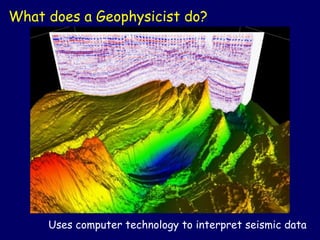All Categories
Featured
Table of Contents
Geophysical Survey - Plaza Of The Columns Complex in Kelmscott Oz 2023
This work is progressively contracted out, so consultancies provide another source of work. Consultancy firms differ in size, from extremely little business to large multinationals. Some consultancies are rather specialised in utilizing specific geophysical strategies or operating in specific places, while others provide a more diverse series of services to their customers.
The extraction of gas from garbage dump sites is another area of work and this might grow in the future. Expedition companies may carry out work for construction companies, water business, mining companies and environmental companies, so geophysicists may be used in any of these settings. Other employers include: geological surveysgovernment bodies and agenciesuniversities and research institutes.


Vacancies may be noted in the oil and gas sector press. Recruitment is impacted by oil cost changes and the level of competition for positions varies depending on this. Careers Days, which cover the complete series of geoscience professions and are generally participated in by a number of essential industry companies, are run by The Geological Society.
Geophysical Surveys: Definition & Methods in Floreat Western Australia 2022
Some of the large oil and gas business offer a complete two-year structured training program throughout the breadth of geophysics, consisting of the chance to experience work in various teams prior to specialising in one area. Your training may consist of work on: existing wellsmagnetic and gravitational potential field information analysisresearchrock analysis. However, it's more usual for your preliminary training to be offered on the job.

There may be a probationary duration throughout which you work together with an experienced associate. Competency-based appraisals occur routinely in many companies. In smaller firms, and for academic posts, there is not likely to be any formal training - you'll be expected to start work straightaway and select up abilities as you go along.
If you work for a smaller company, you may discover that you need to take duty for organizing and funding your own advancement and training. If you have a geology degree, membership of The Geological Society can be helpful for networking and for keeping up to date with the market.
Geophysical Surveys in Winthrop Western Australia 2022
You may also find it beneficial to join the PESGB (The Petroleum Expedition Society of Great Britain, which has a geophysics special interest group. After a probationary duration, and once you have actually gotten some experience, you could advance to senior geophysicist, then team leader and then into a senior function in management.
The ease of movement between roles depends upon the business structure. Study at Masters or Ph, D level in a subject related to geophysics or geosciences may assist with your profession advancement and development. The employment market within the oil and gas market is really depending on price and this might impact your opportunities for profession progression.
For knowledgeable geophysicists, freelance consultancy provides an excellent route for career advancement. As a geophysicist, you're likely to have several jobs throughout your working life.
What Are Geological, Geochemical, in Alfred Cove Western Australia 2020
From geophysics, it's possible to concentrate on seismology (completing further training to end up being a seismic interpreter) or to move into associated locations such as engineering geology or danger forecast.
Deciding what to study in college is a tough option. Even if you understand that your field of interest depends on science, what program of research study is ideal for you? If you make the choice to significant in physical and biological sciences and pursue a profession as a geophysicist, you're preparing for an interesting and successful occupation.
But the initial step to accomplishing your objective of becoming a geophysicist is making a degree. Even for entry-level positions in the field of geoscience, you'll need a bachelor's degree (a geophysicist college degree) from a recognized college or university. Some research study positions require candidates to hold master's degrees or even Ph.
Geophysical Survey Permit Program in Secret Harbour Oz 2020
Doctoral degrees are especially crucial if you prepare to teach at a four-year institution. Geophysicists use physics principles and methods to study the gravitational, magnetic, and electrical fields of the earth. This enhances scientists' understanding of both the planet's interior core and its surface area. Geophysicists need to be able to: analyze rocks, pictures, and other pieces of data conduct research study both in the field and in labs produce maps and charts of their findings compose reports To achieve all this, students require a specialized education for geophysicist careers.
As specified above, you'll require a bachelor's degree in geoscience or an associated discipline, such as a physical science or a life sciences, to land an entry-level job. But students can also prepare by majoring in topics like: Biology Chemistry Computer technology Engineering Mathematics Physics The above geophysicist majors provide a more generalized method to a single clinical discipline, however most programs need students to take several geology course.
Table of Contents
Latest Posts
Greeley-evans Area 3d Geophysical Survey in Bicton Australia 2022
Airborne Geophysical Methods in Bateman Western Australia 2022
Integrated Geophysical Surveys For The Safety in Beeliar Australia 2021
More
Latest Posts
Greeley-evans Area 3d Geophysical Survey in Bicton Australia 2022
Airborne Geophysical Methods in Bateman Western Australia 2022
Integrated Geophysical Surveys For The Safety in Beeliar Australia 2021